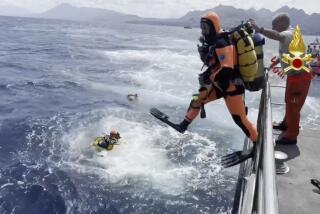Attorney Sentenced to Prison for Fraud
- Share via
A Beverly Hills attorney who scuttled his luxurious 76-foot motor yacht off the Italian coast to collect on a fraudulently inflated insurance policy was sentenced Tuesday to 7 1/2 years in federal prison.
Rex K. DeGeorge, 66, also was ordered to pay $2.8 million restitution to Cigna Property and Casualty Co., which insured the vessel.
DeGeorge, dressed in a drab olive prison jacket, sounded contrite as he addressed U.S. District Judge Lourdes Baird before his sentencing.
During the trial, evidence showed that DeGeorge had earlier claimed and collected insurance from three companies on the mysterious losses of three other yachts.
“Somehow, your words don’t have the ring of truth to me,” the judge told DeGeorge. She described his conduct as arrogant and brazen.
Convicted in March on 16 counts of conspiracy, mail fraud, wire fraud and perjury, DeGeorge faced a term of 6 1/2 to eight years in prison under federal sentencing guidelines. Baird said she decided on a 7 1/2-year sentence because of his age and because he suffers from a mild heart condition.
Defense attorney David Dudley said his client intends to appeal the conviction.
DeGeorge has a history of filing questionable insurance claims dating back three decades.
According to civil court records not introduced at his trial, he filed 32 claims with various insurance carriers from 1976 to 1990, including three for the other yachts that disappeared or sank under mysterious circumstances.
The criminal case against him, developed by investigators from the U.S. Postal Service, stemmed from his purchase in 1992 of the Principe Di Pictor for $1.9 million from an Italian shipbuilder.
Before taking out insurance on the vessel, the jury found, DeGeorge orchestrated a series of sham financial transactions that inflated the yacht’s paper value to $3.6 million and concealed his ownership.
Neil Lerner, a Los Angeles maritime attorney hired by Cigna, investigated the claim and unraveled the scheme.
The insurance company refused to pay and persuaded U.S. District Judge J. Spencer Letts to rescind the policy because DeGeorge had concealed his lengthy record of insurance claims. The judge also ordered DeGeorge to pay Cigna’s legal costs, which exceeded $2.8 million.
Letts was so outraged by what he heard during the civil trial that he referred the matter to the U.S. attorney’s office for criminal investigation. As a result, DeGeorge and two associates were indicted by a federal grand jury in 1999.
Paul A. Ebeling, 62, of St. Louis, and Gabriel Falco, 36, of Amagansett, N.Y., pleaded guilty and testified against DeGeorge. Ebeling was sentenced earlier this week to 18 months already served in custody. Falco received probation.
The two men testified that they and DeGeorge used electric drills and saws to cut holes in the Principe’s fiberglass hull throughout the night of Nov. 7, 1992, in waters about 50 nautical miles from Naples.
But the sturdy vessel refused to sink. At sunrise, an Italian coast guard cutter spotted the partially submerged yacht and sped to the rescue.
Panicked, DeGeorge hastily contrived a story about piracy on the high seas. He told the Italians that he had hired a Russian sea captain named Andrea Libovich and two Russian sailors to ferry the yacht on its maiden voyage from Naples to Greece.
Once in international waters, DeGeorge said, the Russians flashed guns and locked the Americans in a cabin below deck. DeGeorge theorized that the Russians wanted the yacht to run drugs into Italy. But when they realized that the Principe was not very fast, he said, they apparently decided to scuttle the vessel. He said the Russians escaped in a black speedboat just before the Italian cutter arrived.
From the outset, the Italians were dubious about the story. The Americans couldn’t explain why they did not call for help on the Principe’s radio after the Russians fled. They also did not seem happy to be rescued.
After towing the Principe back to shore, the Italians placed DeGeorge, Ebeling and Falco under house arrest while they investigated.
Although they could find no trace of Libovich, no charges were filed and authorities allowed the three to leave after two months.
During the trial, Baird allowed Assistant U.S. Attys. Eileen Decker and William Bottger to mention DeGeorge’s previous yacht sinkings. However, she barred them from presenting details of those incidents because it might prejudice the jurors.
In 1970, DeGeorge claimed that he and a companion were drugged while on an overnight cruise off the Southern California coast by a couple of Peruvian coffee merchants who had expressed an interest in buying his 43-foot yacht. When they came to, he and his acquaintance fled in the yacht’s dinghy, he said.
It took five days before he reported the episode to police. No trace was ever found of the yacht or the Peruvians. DeGeorge received a $43,000 settlement from Hartford Insurance Co.
In 1976, DeGeorge bought a 57-foot racing yacht and went sailing with Ebeling off the coast of Italy. On a starless, moonless night, he said, the vessel hit “a low-profile dark object that was not visible.”
DeGeorge said he and Ebeling escaped in a dinghy before the yacht sank. Lloyds of London at first refused to pay on his $194,000 claim, but relented after he threatened to sue.
In 1983, DeGeorge collected $245,000 insurance after claiming that his 47-foot yacht was blown up during a failed assassination attempt off the Southern California coast.
He told Fireman’s Fund that the attempt on his life grew out of his representation of a client in an acrimonious business dispute.
More to Read
Sign up for Essential California
The most important California stories and recommendations in your inbox every morning.
You may occasionally receive promotional content from the Los Angeles Times.









